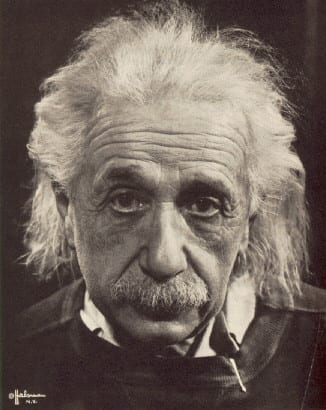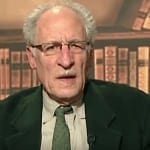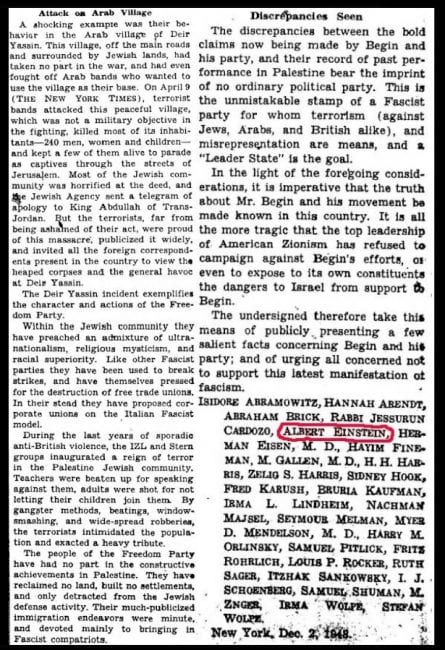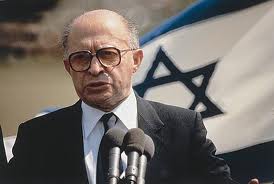
The media never tells the public that Einstein was opposed to the creation of a Jewish state based on zionism, nor that he was a lifelong socialist.
Albert Einstein's letter to the New York Times, dated December 2, 1948 and published by the NY Times on December 4, 1948:
TO THE EDITORS OF NEW YORK TIMES:
[letter titled] “New Palestine Party. Visit of Menachen Begin and Aims of Political Movement Discussed”
Among the most disturbing political phenomena of our times is the emergence in the newly created state of Israel of the “Freedom Party” (Tnuat Haherut), a political party closely akin in its organization, methods, political philosophy and social appeal to the Nazi and Fascist parties. It was formed out of the membership and following of the former Irgun Zvai Leumi, a terrorist, right-wing, chauvinist organization in Palestine.
The current visit of Menachem Begin, leader of this party, to the United States is obviously calculated to give the impression of American support for his party in the coming Israeli elections, and to cement political ties with conservative Zionist elements in the United States. Several Americans of national repute have lent their names to welcome his visit. It is inconceivable that those who oppose fascism throughout the world, if correctly informed as to Mr. Begin’s political record and perspectives, could add their names and support to the movement he represents.
Before irreparable damage is done by way of financial contributions, public manifestations in Begin’s behalf, and the creation in Palestine of the impression that a large segment of America supports Fascist elements in Israel, the American public must be informed as to the record and objectives of Mr. Begin and his movement.
The public avowals of Begin’s party are no guide whatever to its actual character. Today they speak of freedom, democracy and anti-imperialism, whereas until recently they openly preached the doctrine of the Fascist state. It is in its actions that the terrorist party betrays its real character; from its past actions we can judge what it may be expected to do in the future.
Attack on Arab Village
A shocking example was their behavior in the Arab village of Deir Yassin. This village, off the main roads and surrounded by Jewish lands, had taken no part in the war, and had even fought off Arab bands who wanted to use the village as their base. On April 9 (THE NEW YORK TIMES), terrorist bands attacked this peaceful village, which was not a military objective in the fighting, killed most of its inhabitants (240 men, women, and children) and kept a few of them alive to parade as captives through the streets of Jerusalem. Most of the Jewish community was horrified at the deed, and the Jewish Agency sent a telegram of apology to King Abdullah of Trans-Jordan. But the terrorists, far from being ashamed of their act, were proud of this massacre, publicized it widely, and invited all the foreign correspondents present in the country to view the heaped corpses and the general havoc at Deir Yassin.
The Deir Yassin incident exemplifies the character and actions of the Freedom Party. (Continues below)
Within the Jewish community they have preached an admixture of ultranationalism, religious mysticism, and racial superiority. Like other Fascist parties they have been used to break strikes, and have themselves pressed for the destruction of free trade unions. In their stead they have proposed corporate unions on the Italian Fascist model.
During the last years of sporadic anti-British violence, the IZL and Stern groups inaugurated a reign of terror in the Palestine Jewish community. Teachers were beaten up for speaking against them, adults were shot for not letting their children join them. By gangster methods, beatings, window-smashing, and wide-spread robberies, the terrorists intimidated the population and exacted a heavy tribute.
The people of the Freedom Party have had no part in the constructive achievements in Palestine. They have reclaimed no land, built no settlements, and only detracted from the Jewish defense activity. Their much-publicized immigration endeavors were minute, and devoted mainly to bringing in Fascist compatriots.
Discrepancies Seen
The discrepancies between the bold claims now being made by Begin and his party, and their record of past performance in Palestine bear the imprint of no ordinary political party. This is the unmistakable stamp of a Fascist party for whom terrorism (against Jews, Arabs, and British alike), and misrepresentation are means, and a “Leader State” is the goal.
In the light of the foregoing considerations, it is imperative that the truth about Mr. Begin and his movement be made known in this country. It is all the more tragic that the top leadership of American Zionism has refused to campaign against Begin’s efforts, or even to expose to its own constituents the dangers to Israel from support to Begin.
The undersigned therefore take this means of publicly presenting a few salient facts concerning Begin and his party; and of urging all concerned not to support this latest manifestation of fascism.
[27 signers]
ISIDORE ABRAMOWITZ,
HANNAH ARENDT,
ABRAHAM BRICK,
RABBI JESSURUN CARDOZO,
ALBERT EINSTEIN,
HERMAN EISEN, M.D.,
HAYIM FINEMAN, M. GALLEN, M.D.,
H.H. HARRIS,
ZELIG S. HARRIS,
SIDNEY HOOK,
FRED KARUSH,
BRURIA KAUFMAN,
IRMA L. LINDHEIM,
NACHMAN MAISEL,
SEYMOUR MELMAN,
MYER D. MENDELSON, M.D.,
HARRY M. OSLINSKY,
SAMUEL PITLICK,
FRITZ ROHRLICH,
LOUIS P. ROCKER,
RUTH SAGIS,
ITZHAK SANKOWSKY,
I.J. SHOENBERG,
SAMUEL SHUMAN,
M. SINGER,
IRMA WOLFE,
STEFAN WOLFE.
New York, Dec. 2, 1948
![]() Addendum
Addendum
 “PM Netanyahu’s Remarks at the Menachem Begin Heritage Center Event Marking Israel’s 70th Anniversary”
“PM Netanyahu’s Remarks at the Menachem Begin Heritage Center Event Marking Israel’s 70th Anniversary”
(https://archive.md/Wz153)
23/04/2018
Thank you Herzi Makov, and thank you distinguished diplomats and friends. It’s an honor for me to be here at the Menachem Begin Heritage Center. We’re celebrating Israel’s 70th anniversary, and we can celebrate at the same time, and for good reason, for three reasons Menachem Begin’s legacy. There are many reasons to celebrate Begin’s legacy, but I believe that three things make him stand out as a true hero of our people.
The first one is liberty. Begin was a great champion and fighter for Israel’s independence. He, in his memoir The Revolt, he wrote that the “be all and end all” of his ideology was “[f]reedom—the freedom and happiness of the individual.” Also the freedom of our people, which is what that book describes. He understood that there can be no neutrality in the fight for freedom. He wrote, “If you love freedom, you hate slavery.”
And Begin hated all forms of tyranny. He wrote that one’s “very self-respect as a human being lies in resistance to evil.” And that meant sacrifice. Begin was willing to sacrifice for the liberty of our people. He wrote, “The idea of freedom had captured our hearts completely… The individual identified himself with that idea. And if it meant the surrender of his personal liberty—he surrendered it; if it required that he leave his family—he left it; if it involved the enduring of torture—he accepted it; if it called for continuous exposure to danger—he resigned himself to it; if it demanded his life—he gave it.”
So in many ways, Menachem Begin symbolized the essence of our struggle for liberty. He fought for it, he sacrificed for it; he achieved it. And it is our struggle to be a free people in our ancestral homeland that guided his life, and he serves as an emblem and as an example for future generations, because the battle is never over.
And for the purpose of having future generations understand the necessity of sacrifice and the meaning of Begin’s life, I think that this Center serves a unique purpose. I always say that you made it too small, that the traffic flow is insufficient. How many people visit every year? [One hundred and fifty thousand.] Not enough. A hundred and fifty thousand? It should be three hundred and fifty thousand, and we should find the means to achieve this. But I want young Israelis to come here so that they understand fully the importance of being a free people in our own land—unapologetic Jews, proud Jews. This is the only way that we can maintain our heritage and secure our future.
The second reason Begin is remembered is because of security. Begin understood that security comes first. All the other attributes of independence ultimately pale and wither away if you cannot defend your security. In 1981, he dispatched the IDF to destroy the nuclear reactor of a genocidal tyrant that called for the annihilation of Israel. His policy was simple; his policy was right. He said that we will not allow regimes that call for Israel’s destruction to acquire nuclear weapons.
Does anyone remember how the world reacted to this strike? This is the strike that genuinely blocked Saddam’s path to nuclear weapons. Well, the UN passed Resolution 487 strongly condemning Israel. A leading European diplomat—I’m now the Foreign Minister, I have to be careful—he said this air strike on Saddam’s nuclear reactor was unacceptable. The New York Times of course criticized it. What’s new?
Begin was unflinching, and Israel’s policy has not changed since Begin. Israel will not allow regimes that seek our annihilation to acquire nuclear weapons. This is why we opposed so resolutely the Iran deal, because it gives Iran a clear path to a nuclear arsenal. It allows, over a few years, unlimited enrichment of uranium, the core ingredient required to produce nuclear bombs—and nothing else—and it also does not deal with the ballistic missiles that can deliver this weapon to many, many countries. This is why this deal has to be either fully fixed or fully nixed.
And I believe that Begin exemplified for us the commitment to defend Israel’s security at all costs, although I believe that in so doing, in the case of Iraq and now in the case of Iran, the security of the entire world is at stake.
There is a third reason why I think Begin is remembered with unique fondness, and that is inclusivity. Begin opened up Israeli society. Up to the election of, the great election in which the Likud won the victory under his leadership, the government never changed. It was always one party and many people felt that they were out of the loop, that they weren’t part of Israeli society. And this changed very dramatically with Begin. He immediately began a program to upgrade what we call the neighborhoods; that means those neighborhoods in development towns and in Tel Aviv and the center of the country that were left untended. They were dilapidated. And in the physical restructuring of those neighborhoods was really a psychological restructuring, telling people, all strata of Israeli society: You are all part of this one country. You all deserve a place of honor and integrity. You all can be leaders in this country.
And he changed this. He brought young mayors from the development towns into the Likud, and he truly revolutionized Israeli society and Israeli politics in the best sense of the word: inclusivity—an open, inclusive society, open to all. And this has made Israel a tremendous, tremendously vibrant country.
These are the three reasons that I think Begin is remembered with affection and respect: liberty, security, inclusivity. But there are many others.
I think the most important one is passion. Begin had a passion for our people, for our reconstituted place in history, for justice and truth. I remember that I was a young diplomat. I had just been, I just entered diplomatic life as the number two in our embassy in Washington. Israel was maligned as though the Israeli army had sent or allowed or even dispatched Christian Lebanese to commit a massacre. And he called me up, and he said, “Mr. Netanyahu…” He knew me because he knew my father. He said, “Please take a pen and a pencil and please write this blood libel.” He started, and he said, “I want an ad in the New York Times: Blood libel.” And he wrote the ad, and I wrote the ad, and it was written from the heart, from the mind too, but from the heart, because he couldn’t accept the defamation of the Jewish people. He, who understood the horrors of the Holocaust and knew what we were fighting for, knew what values we stood for, he couldn’t accept this slandering of the Jewish state.
And I felt that passion. I think every Israeli felt that passion. And I think that many around the world felt that passion too. And even though some may not have agreed with him, they respected him for it because they knew it was true.
So for these reasons and more, we remember Begin. You asked me, however, to talk about our position in the world. Well, I think Begin helped change it in many ways. I think that today Israel’s diplomatic position is better than it’s ever been, because many countries around the world understand what Israel can offer—the security we can offer against terrorism that plagues so many lands, so many continents, in fact virtually all lands in all continents, and the benefits that our ingenuity can bring to all lands in all continents. This is taking shape before our eyes.
There are many distinguished representatives here. I’ve been put right between the Ambassador of the United States, who knows this very well, and our alliance is as strong as it’s ever been. We look forward in a few days to open up the American embassy in Jerusalem, and we are deeply appreciative of President Trump’s historic decision. I just came from my office, and right next to my office is the Israeli cabinet room. And at the entrance of this cabinet room are two documents: One, President Truman’s historic recognition of the Jewish state; and right next to it, President Trump’s historic recognition of Jerusalem as Israel’s capital.
So our alliance with the United States has been steadfast and growing stronger and stronger, year by year. But equally, we appreciate the fact that we have these relations, growing relations with so many others, and I am seated right next to the Ambassador of India. It’s good to see you. And I can tell you that I had a wonderful trip to India after Prime Minister Modi and I waded in the waters of the Hadera beach. It was a tremendously moving experience to see the support and enthusiasm for Israel in India.
And we see this everywhere. We see it in so many countries, in so many lands, who understand that their people can have a better life by cooperating with Israel in so many fields. I have to say that one of the meetings that I remember most was a meeting in the United Nations—yes Herzi, the United Nations. It’s not completely nothing you know. It has its uses and its purposes, and we seek the alliances with many countries, and the goodwill of the international community. We don’t always get it, and certainly we don’t get it at the UN, but at the UN I met many, many African leaders who came to a special exposition that we did on Israeli technology in Africa.
And one after the other, these young Israelis, men and women, showed what they were doing to help villagers have water. An African woman would have to walk four hours one direction to a distant well, and walk back four hours to bring water to her children. And Israeli innovation gave her water from the air. You know, Moses hit the rock and got water? These Israelis hit the air and they get water. It’s miraculous. Anything that you can think of—in agriculture, in health, in IT—Israeli technology was revolutionizing, is revolutionizing Africa.
And one African leader said to me afterwards, he said, “Tell me, tell me. What is your secret? How come this small people is making all these tremendous things? What is your secret, because we want to replicate it?” And I said, “Well, you know, if I have to explain what our secret is, it’s a unique combination. We’re an ancient people, one of the most ancient peoples on earth. We’re an ancient people with deep roots in our traditions, in our ancestral homeland, but we throw our branches to the sky, with never-ending curiosity and with this desire to change things for the better, to fix the world. We call it tikkun olam.”
And this combination of deep heritage and this constant thirst for innovation is what makes the Jewish people so unique. I think it’s what makes the Jewish state so unique, and I’m very glad that so many countries around the world today are discovering these capacities of Israel, and that our friendships are blossoming as never before.
I think much of this we have to thank for Menachem Begin. I think if Begin was with us today, I think he’d be proud. He sees that we have a thriving democracy that guarantees the freedom of the individual, the freedom of worship to all religions, just as Begin believed. We have a tolerant society that improves the lives of people around the world, just as Menachem Begin believed. We’re at peace with Egypt, a peace that Begin worked for and achieved, and we have peace with Jordan, and our hand is extended to peace to all our neighbors. And I believe that something is changing, perhaps not in our immediate vicinity with our Palestinian neighbors, but beyond that there is no question that many Arab governments, and quite a few of the Arab publics, are reexamining their attitudes towards Israel because of all the reasons that I mentioned, including Iran.
We have, I think, much to be proud for, about, and I think we have Menachem Begin to be proud about. So today I ask everyone listening to me to honor the memory of Menachem Begin. If you haven’t already done so, read The Revolt. You’ll understand what a true hero this man was, and join me and all Israelis in celebrating our 70th anniversary. I have no doubt that, in another 70 years, Israel will be even stronger and more prosperous than it is today. And Menachem Begin would be very, very proud.
Thank you.
http://cosmos.ucc.ie/cs1064/jabowen/IPSC/php/art.php?aid=1131
Title: “Apartheid Laws in Israel — The Art of the Obfuscatory Formulation”
https://web.archive.org/web/20030422175740/http://aldeilis.net/zion/zionrac03.html
By: Uzi Ornan [See here and here for information about him.]
Published in: Ha’aretz
Date of issue: 17 May 1991
Topic(s) addressed: Israeli apartheid (הפרדה, ‘hafrada’)
 ERIC ZUESSE, Senior Contributing Editor • Investigative historian Eric Zuesse is the author, most recently, of They’re Not Even Close: The Democratic vs. Republican Economic Records, 1910-2010, and of CHRIST’S VENTRILOQUISTS: The Event that Created Christianity. Besides TGP, his reports and historical analyses are published on many leading current events and political sites, including The Saker, Huffpost, Oped News, and others.
ERIC ZUESSE, Senior Contributing Editor • Investigative historian Eric Zuesse is the author, most recently, of They’re Not Even Close: The Democratic vs. Republican Economic Records, 1910-2010, and of CHRIST’S VENTRILOQUISTS: The Event that Created Christianity. Besides TGP, his reports and historical analyses are published on many leading current events and political sites, including The Saker, Huffpost, Oped News, and others.






